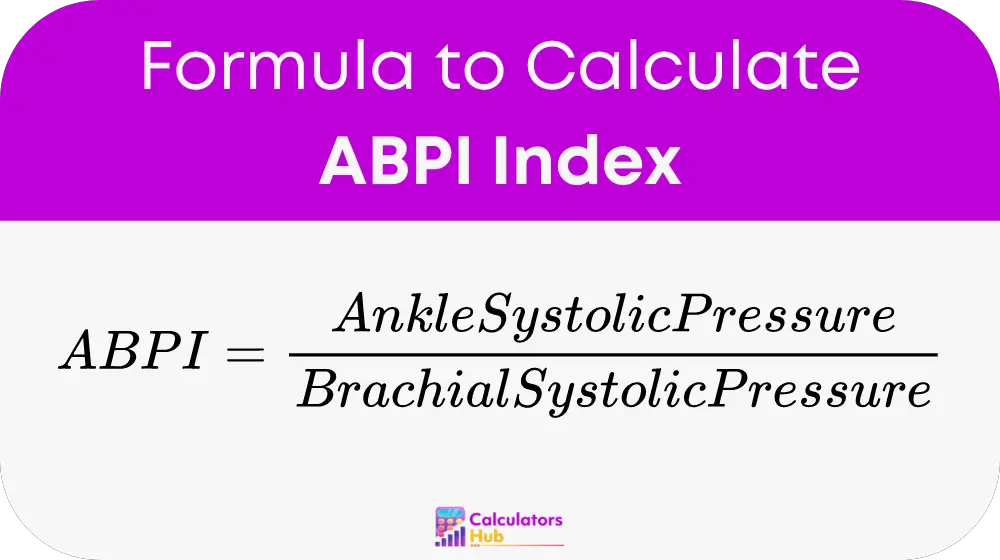The Ankle-Brachial Pressure Index (ABPI) Calculator is a tool used to find out if someone has peripheral artery disease (PAD). PAD is a condition where the arteries in the legs are narrowed or blocked, reducing blood flow. The ABPI Index Calculator helps to see how severe this condition is by comparing the blood pressure in the ankle to the blood pressure in the arm.
Formula of ABPI Index Calculator
The Ankle-Brachial Pressure Index (ABPI) is calculate using the following formula:

Steps to Calculate ABPI:
- Measure the systolic blood pressure at the ankle using a Doppler ultrasound device.
- Measure the systolic blood pressure at the brachial artery in the arm.
- Divide the ankle systolic pressure by the brachial systolic pressure to get the ABPI.
Interpretation of ABPI Values:
- ABPI 1.0 to 1.4: Normal
- ABPI 0.9 to 1.0: Acceptable
- ABPI 0.8 to 0.9: Some arterial disease
- ABPI 0.5 to 0.8: Moderate arterial disease
- ABPI less than 0.5: Severe arterial disease
An ABPI greater than 1.4 may indicate stiff arteries, which can also be a sign of other vascular diseases. Further investigation may be need in such cases.
Common Terms and Values Table
Below is a table with common terms and pre-calculated ABPI values for easy reference:
| Ankle Systolic Pressure (mmHg) | Brachial Systolic Pressure (mmHg) | ABPI | Interpretation |
|---|---|---|---|
| 120 | 120 | 1.0 | Normal |
| 110 | 120 | 0.92 | Acceptable |
| 90 | 120 | 0.75 | Some arterial disease |
| 70 | 120 | 0.58 | Moderate arterial disease |
| 50 | 120 | 0.42 | Severe arterial disease |
Example of ABPI Index Calculator
Let's go through a practical example of how to use the ABPI Index Calculator.
- Measure the systolic blood pressure at the ankle: 100 mmHg.
- Measure the systolic blood pressure at the brachial artery: 120 mmHg.
- Calculate the ABPI:
ABPI = 100 / 120 = 0.83
Interpretation: An ABPI of 0.83 indicates some arterial disease.
Most Common FAQs
The normal range for ABPI is between 1.0 and 1.4. Values within this range indicate normal blood flow.
No, ABPI is specifically use to diagnose peripheral artery disease (PAD). While an ABPI greater than 1.4 may indicate other vascular diseases, more tests are need for a complete diagnosis.
If your ABPI value is outside the normal range, you should talk to a healthcare professional for further evaluation and possible treatment. Early detection and management are important to prevent complications related to PAD.